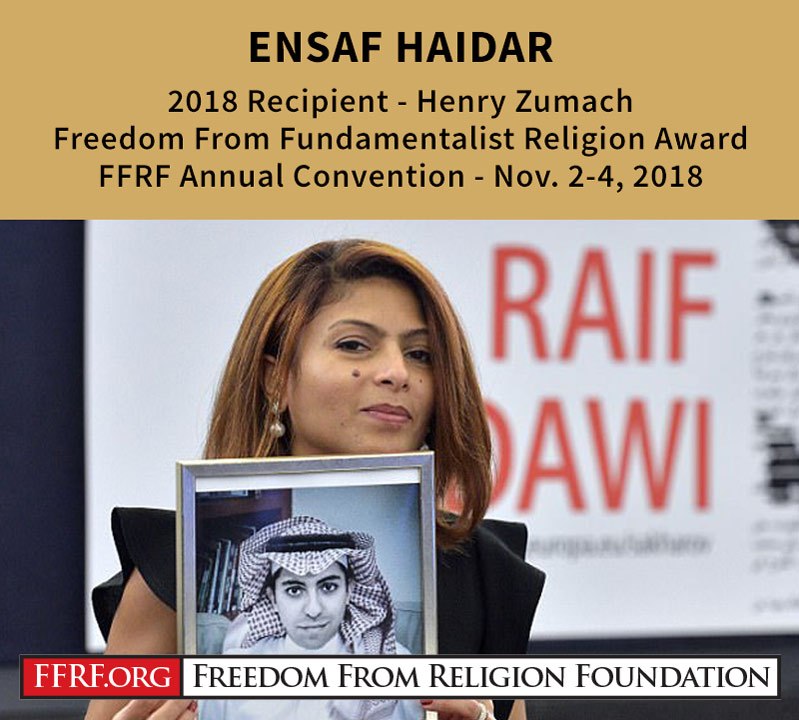
The United States should be following the lead of Canada in condemning human rights violations in Saudi Arabia. Instead, U.S. inaction corresponds to Saudi Arabia’s aggressive and reactionary response to Canada’s criticism of recent arrests of Saudi rights activists.
Yesterday, Saudi Arabia expelled the Canadian ambassador after Canada’s foreign minister called for the release of political prisoners Samar and Raif Badawi.
Canada’s admirable interest in ending the illegal and inhumane treatment of the Badawis is due in large part to the advocacy of Raif Badawi’s wife, advocate Ensaf Haidar. Haidar received political asylum in Canada along with her three children and became a Canadian citizen last month. Haidar, the president and cofounder of the Raif Badawi Foundation for Freedom, will be FFRF’s upcoming 2018 recipient of the $10,000 Henry Zumach Freedom From Religious Fundamentalism Award. She’ll be receiving the award and speaking at FFRF’s Nov. 2-4 national convention in San Francisco.
Raif Badawi, initially arrested on charges of apostasy, which carries an automatic death sentence, was convicted in July 2013 for founding an internet forum that “violates Islamic values and propagates liberal thought,” and was sentenced to 600 leashes and seven years in prison. He was re-sentenced in May 2014 to 1,000 lashes and 10 years in prison, with a major fine added. After Badawi was subjected to 50 lashes in 2015, a global movement sprang up in his defense, which halted the whippings.
It’s unclear why Badawi’s sister, Samar Badawi, was arrested last week. Ms. Badawi, a women’s and human rights activist and recipient of the U.S. State Department’s International Woman of Courage Award in 2012, was arrested two years ago for similarly undefined offenses under Saudi Arabia’s laws restricting free speech. Those laws continue to be harshly enforced by Crown Prince Mohammed bin Salman, despite his supposed reformist tendencies.
The New York Times reports that “the Saudi Foreign Ministry called the Canadian statements ‘blatant interference in the kingdom’s domestic affairs”’ and declared the Canadian ambassador, Dennis Horak, persona non grata, giving him 24 hours to leave the kingdom.”
In addition to expelling Horak, Saudia Arabia froze all business and investment deals with Canada and withdrew its own ambassador. Saudi Arabia also threatened to withdraw Saudi students from Canadian schools and universities. All of this for what The New York Times characterizes as a “pro forma complaint” from Canada.
On Monday morning, a pro-government Saudi Twitter account tweeted an infographic seemingly depicting an airliner headed toward the downtown Toronto skyline. The message, which was quickly deleted, superimposed over the threatening image a warning to Canada: “Sticking one’s nose where it doesn’t belong! He who interferes with what doesn’t concern him finds what doesn’t please him,” viewed as an overt reference to the terrorist attacks of September 11, 2001. Although the tweet was deleted, with an apology, another replaced it with the same wording, minus the threatening visual.

The U.S. State Department, for its part, offered little in response to the arrest of Badawi’s sister. The New York Times quoted an email from State Department spokeswoman Jessica Eldosoky: “We continue to encourage the government of Saudi Arabia to respect due process and to publicize information on the status of legal cases,” and will “address these broad concerns in our annual Human Rights Report.”
Clearly, standing up to theocrats in support of the right to free speech and expression is not high on the Trump Administration’s concerns. It should be. Especially when one of our closest allies is fighting on behalf of political prisoners.

